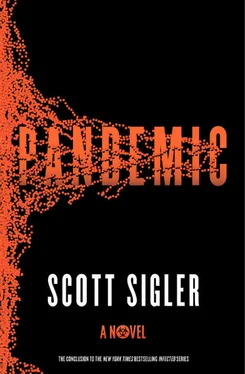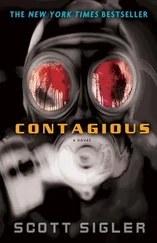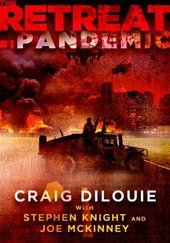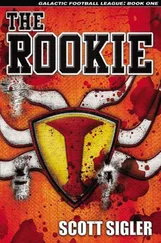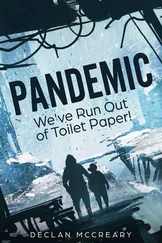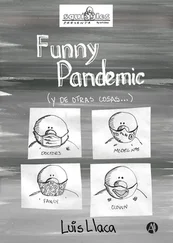“I’m not talking about stealing it,” Murray said. “I’m talking about touching it. We just lost a nuclear sub, a destroyer, a cutter and over four hundred brave men and women. That didn’t happen by accident. If the wreckage was somehow contaminated with any of the contagious shit that forced us to nuke Detroit, then the Chinese don’t have to get the thing out of the country, they just have to be dumb enough to go down and try . That alone could be enough to goat-fuck us right in the ass.”
“That’s enough ,” President Blackmon said.
Murray didn’t know if she’d had that voice of unquestionable authority before she took over as commander in chief, but she sure as shit had it now.
“This briefing is over,” she said. “I think Director Vogel has clearly illustrated that the site is protected against espionage. He’s doing his job. Murray, you do yours. Find out what turned the crew of the Los Angeles into traitors, and find out fast.”
Margaret’s belly wanted to be sick, but Margaret was in charge of such things and she was not going to let this helicopter ride make her throw up.
She’d spent most of the last three years sequestered in her house. Now here she was, at 4:00 A.M., in a loud-as-hell helicopter streaking across the black surface of Lake Michigan, strapped tightly into an uncomfortable seat and wearing an ill-fitting helmet. Her soon-to-be-ex husband sat next to her, a constant reminder of her failures as a wife.
How had Murray talked her into this?
Maybe it hadn’t been Murray at all. Maybe it was because the infection had returned, and she couldn’t stand aside while others fought that evil for her.
Before “Project Tangram,” before she and Amos stumbled onto something that would turn out to be one of humankind’s biggest and worst discoveries, she had been an epidemiologist with the CDC. She hadn’t been a “nobody,” by any stretch, but no one had really known who she was.
The infection changed all that.
She moved from a back room to the front line. She had become the one , the person who figured it out, who stopped it. Doing so had cost so many lives; it had destroyed hers as well.
She should have been a celebrity, a hero. She should have been an icon of the scientific world. Instead, she had suffered so much in the past five years. Lost so much. She wasn’t going to let that be for nothing.
You will not win. I WILL beat you .
The pilot’s voice came over the headphones built into her helmet.
“We’re coming up on the task force,” he said. “We’re on high alert, so this will be a slow approach as they make sure everything is okay. If you look out the port side, you can see the task force coming up pretty quick.”
Margaret readjusted her loose helmet as she looked. Rain pounded against the helicopter’s windshield. She could see no stars, nothing but black above and below. Then, in the distance, she saw the glow of lights.
Warships, on the Great Lakes. And the concept of lake didn’t really register — she couldn’t see land in any direction, not even the distant sparkle of cities or towns.
As the helicopter closed in, the faint lights of the four gray ships became more clear. The ships were big… so big they seemed to ignore tall, black, undulating swells that could have dragged normal boats to the bottom. The longest of the gray ships looked boxy, like a cargo hauler. Two others were nearly as big but had the sleek lines of combat vessels. One rode tall in the water, pristine and impressive, while the other listed slightly to port, parts of its superstructure blackened and twisted. It took her a moment to realize the two ships were identical, a before-and-after image representing the effects of combat. The smallest of the four didn’t look like any ship she had ever seen.
Margaret pulled on Clarence’s sleeve and pointed at the identical pair’s undamaged ship. She tried to lean into him and cracked her helmet against his. He reached up, tapped the helmet’s microphone sitting directly in front of her mouth.
“Oh,” she said. “Sorry.” She didn’t need to yell over the helicopter’s engine to be heard. She pointed out again. “What is that?”
“That’s the Pinckney ,” Clarence said. “Arleigh Burke class guided missile destroyer. It’s the flagship of the flotilla. The one that’s listing is the Truxtun . The one that looks like a tanker is the Carl Brashear . That’s where we’re headed. It’s about seven hundred feet long, so your motion sickness should settle down once we’re aboard.”
She hadn’t told him she felt ill. He just knew.
Margaret gestured to the final ship, the smallest of the four. Its long, thin, pointed nose widened near the base, flaring out into the superstructure, which itself led to a flat, square back deck. The ship’s steeply sloped sides reminded her, somewhat, of the old Civil War ironclads, and yet the vessel’s overall appearance was that of a spaceship from a science fiction movie. On the back deck, she saw two helicopters, ready and waiting.
“That’s the Coronado ,” Clarence said. “It’s new. It’s called a littoral combat ship.”
“So it literally does combat?”
“Not lit-ER-al, lit-OR-al ,” he said. “It means close in to shore . That’s where SEAL Team Two is.”
Guided missile destroyers. Littoral combat ships. SEALs. This was the equivalent of putting a floating flag in the middle of Lake Michigan and telling the rest of the world this is ours, and if you even look this way, you’re going to get a black eye .
How typical. Five years after what could have been the extinction of the human race, and her government chose to rattle its saber instead of working with other countries to share the biggest scientific discovery in history.
And yet as impressive as three of the four ships looked, she realized that just a day ago there had been a total of seven: two more on the surface, one below. Somehow, the infection had taken them out.
I will beat you .
The helicopter suddenly plummeted, an elevator with the cable cut. Just as quickly the drop ended with a hard rattle that bounced her in her seat and jostled her loose helmet.
“Sorry about that,” said the pilot’s voice in her earphones. “The wind is pretty tricky. Turbulence is going to be rough as we come in to land. Hold tight.”
Something seemed to slap the helicopter’s left side. Margaret’s stomach let out a brief-but-intense prepuke warning. She started to look for something to throw up in, but Clarence was already offering her an open barf bag.
Margaret held it to her mouth as she discovered that she was not, after all, in charge of such things. She kept throwing up as the helicopter descended toward the Carl Brashear .
MUTUALLY ASSURED DESTRUCTION
Steve Stanton stood at the rail of the Mary Ellen Moffett , wondering if the phrase “freezing your nuts off” was less a figure of speech and more an accurate scientific possibility.
He stared out at an endless black surface, not that he could see all that far at 5:00 A.M. on a starless morning. November wind tore at his raincoat. Five-foot swells slapped against the hull, splashing icy spray into his face. He’d been out on the lake dozens of times while testing the Platypus , but until this moment he had never, in his entire life, been in a place where he couldn’t see land. He felt like a shivering speck in the middle of nowhere, like a satellite surrounded by the expanse of space.
Bo Pan stood next to him. The old man had already thrown up over the rail once. He looked like he might soon do so again.
Читать дальше
